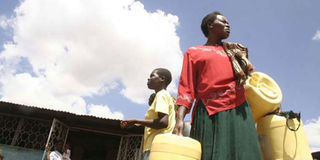Dry taps greet Nairobi city dwellers

Majority of residents within Nairobi city are experiencing water shortage, after the Nairobi Water and Sewerage Company announced it will reduce supply in the city by 13 per cent in a bid to be able to supply water to the city up to April. PHOTO | FILE | NATION MEDIA GROUP
What you need to know:
- In South C, residents have not been having water for the last one week but they had invested in storage containers, said a resident.
- Through a statement, Nairobi water managing director Philip Gichuki said there was no run off to the dams therefore water had not been replenished.
- The firm will reduce supply in Nairobi by 13 per cent in a bid to serve the city up to April.
Residents of Nairobi are a worried lot over water rationing as five estates in the city have had dry taps for the past one week.
However, the impact of water shortage is yet to take full effect, following an announcement by the Nairobi Water and Sewerage Company to ration the commodity from January 1. This is because of low water levels in the dams following failed rains.
In Huruma, residents said that they have not had water for the last one month therefore they are used to dry taps.
However, John Mwangi, who runs a water kiosk from the Moi Airbase main pipe supply, said that the business is booming since he is supplying water to Huruma at a cost.
Mr Mwangi said that he sells water to suppliers at Sh5 for every 20 litres and they in turn sell to residents at Sh50 for the same quantity.
“I make between Sh4,000 and Sh10,000 a day since we had water shortage and its clean water from the Airforce main water line,” he said.
Mr Mwangi said that when there is a normal supply they sell a jerrry can at Sh3 which is sold to residents at Sh20.
The main Moi Airbase water line has more than 10 water points where illegal connections exist which supply different businesses such as a laundry, carwash and adjacent hotels.
Chrispin Ngara, one of the vendors, who owns a cart said that he makes more than 20 trips in a day and the business is going to earn him more if the water rationing continues.
Businessmen in Kiamaiko - the biggest goat market in Huruma - said that water shortage in the area will affect the business as they have to maintain cleanliness to stop disease outbreaks.
Mr Kuno Gayo, a butchery man in Kiamaiko, said that in a day they use 2,000 litres of water and since they heard that water will be scarce they have improvised ways to save more water.
In Mathare, residents have expressed fears that water suppliers will be hoarding the commodity so that they can hike prices in the area once the water company completely cuts off the supply.
Ms Millicent Atieno of Mathare North said that rationing is not acute as it is systematic.
“Since last week, we seem to have the water cut in some pattern such that one plot has water while the neighbouring plot gets in the evening so the problem is manageable,” said Ms Atieno.
In South C, residents have not been having water for the last one week but they had invested in storage containers, said a resident.
Through a statement, Nairobi water managing director Philip Gichuki said there was no run off to the dams therefore water had not been replenished.
The firm will reduce supply in Nairobi by 13 per cent in a bid to serve the city up to April.




